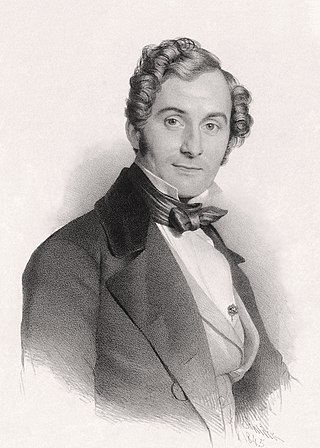
Gustav Albert Lortzing was a German composer, librettist, actor and singer. He is considered to be the main representative of the German Spieloper, a form similar to the French opéra comique, which grew out of the Singspiel.

Charlotte Birch-Pfeiffer was a German actress, writer, director of the Stadttheater in Zürich for six years, and author of over 100 plays and libretto.

Johanna Jachmann-Wagner or Johanna Wagner was a mezzo-soprano singer, tragédienne in theatrical drama, and teacher of singing and theatrical performance who won great distinction in Europe during the third quarter of the 19th century. She was a niece of the composer Richard Wagner and was the original performer, and in some respects the inspiration, of the character of Elisabeth in Tannhäuser. She was also the original intended performer of Brünnhilde in Der Ring des Nibelungen, but in the event assumed other roles.

Landestheater Detmold is a theatre for operas, operettas, musicals, ballets, and stage plays in Detmold, North Rhine-Westphalia, Germany. It began as the Hochfürstliches Lippisches Hoftheater, founded in 1825 by the court of Lippe. The company has five venues in Detmold. With its guest appearances in more than a hundred locations in Germany and neighboring countries, the theatre company states that it is the largest touring company in Europe.
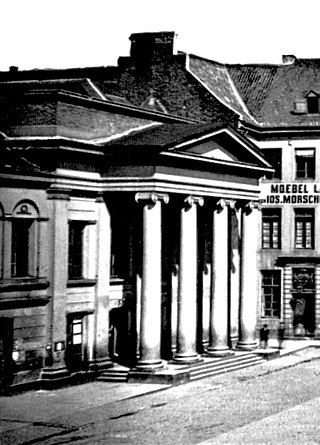
Altes Theater was a theatre in Düsseldorf, North Rhine-Westphalia, Germany. It operated between 1747 and the early 1870s, when it was replaced by the Stadttheater Düsseldorf.
Edith Kertész-Gabry was a Hungarian soprano and professor of opera at the Cologne University of Music.

Der Waffenschmied is an opera (Singspiel) in three acts by Albert Lortzing. The German-language libretto was by the composer after Friedrich Wilheim von Ziegler's Liebhaber und Nebenbuhler in einer Person. This is often considered his third most popular work. His works are considered to be part of the Biedermeier period. It premiered in Vienna at the Theater an der Wien on 31 May 1846 conducted by Lortzing. The role of Marie was written with Jenny Lind in mind who he hoped would sing the part. The opera was eventually successful enough that Lortzing was offered the post of Kapellmeister at the theatre which he held until the revolution of 1848, when he had to return to Leipzig. Arnold Schönberg, arranged Lortzing's "Waffenschmied“ for piano for 4 hands. The story is set in the city of Worms in the 16th century.
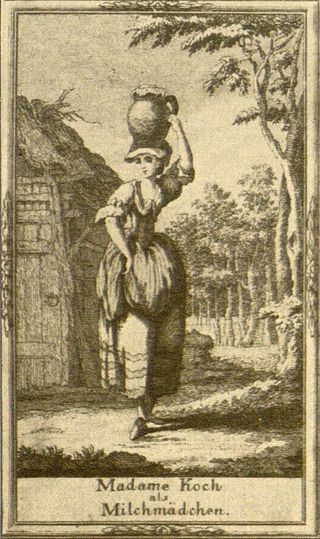
Franziska Romana Koch, née Gieraneck, Giwraneck, Giraneck, Jiránek (1748–1796) was a German ballet dancer, soprano, and actress. First a dancer as the member of the theatre company Kochische Gesellschaft, she also trained her voice and worked at the court theatre of Weimar. Anton Schweitzer composed the opera Alceste for her, and its librettist Christoph Martin Wieland celebrated her performance in the title role in a poem. She later worked in Gotha, and finally in Leipzig as a member of Bondini's company, where she retired in 1787.

Ali Pascha von Janina oder Die Franzosen in Albanien is a one-act German singspiel. It is set around 1820 in Ioannina, then part of the Ottoman Empire and is named after its central character Ali Pasha of Ioannina.

Deutsche Wanderbühne is the term for roving German-speaking, theatrical troupes or travelling operas, consisting of professional actors and musicians. They were financially independent but did not have their own fixed stage.
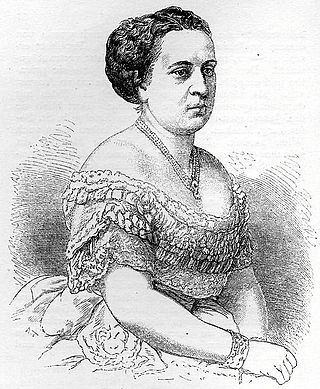
Luise Meyer-Dustmann was a German opera singer (soprano), and singing teacher.

Die Opernprobe, also titled Die vornehmen Dilettanten, is a comic opera (Spieloper) in one act by Albert Lortzing, to a libretto which he adapted from a play by Philippe Poisson which had been translated by Johann Friedrich Jünger. The premiere was on 20 January 1851 at the Oper Frankfurt.
Karoline Stern was a German opera soprano. She was the inspiration for one of Heinrich Heine's first published poems: "An eine Sängerin – Als sie eine alte Romanze sang".
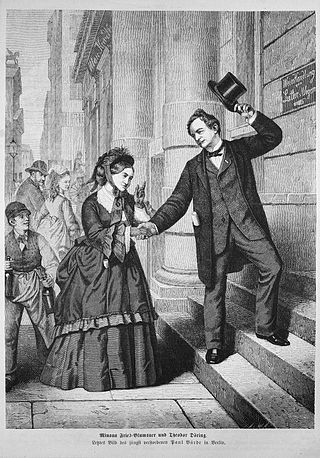
Minona Frieb-Blumauer was a German actress and singer.
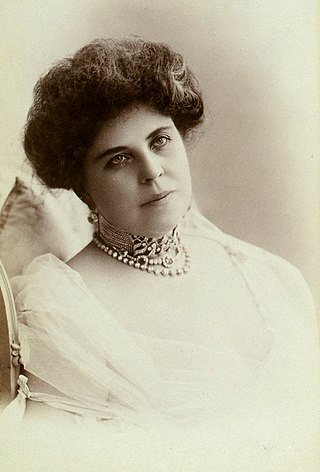
Agnes Freund (née Voß was a German stage actress.
Margarete Düren or Margarethe Düren-Herrmann was a German operatic soprano. She was based at the Staatsoper Stuttgart until 1939, where she appeared in the world premiere of Nico Dostal's operetta Monika, in the title role. With her husband Josef Herrmann she moved on to the Semperoper in Dresden and further to Berlin. They appeared and recorded together. After his death, she moved to Cologne, where she served as a prompter until age 89.

Lina Fuhr, real name Karoline Fuhrhaus, also Lina Waldau was a German stage actress.

Auguste Sophie Crelinger (widowed Stich, born Düring was a German stage actress.

Pauline Sophie Bertha Stich, married name Miehe from 1844, was a German stage actress.

Hedwig Reicher-Kindermann (1853–1883) was a German opera singer whose range covered both soprano and contralto. She trained as a pianist until she was 15 when her father recognized her singing abilities. In 1871, she was engaged by the Court Theatre in Munich where she performed as a singer, dancer and actress. After singing in Bayreuth in 1876, she made guest appearances in Austria, France and Italy. In 1880, she was engaged by the Leipzig Opera where she became known for her Wagnerian roles. From September 1882, she toured widely with Angelo Neumann's Niebelungentheater but died in Trieste, Italy, on 2 June shortly after appearing as Brünnhilde in Wagner's Götterdämmerung.














